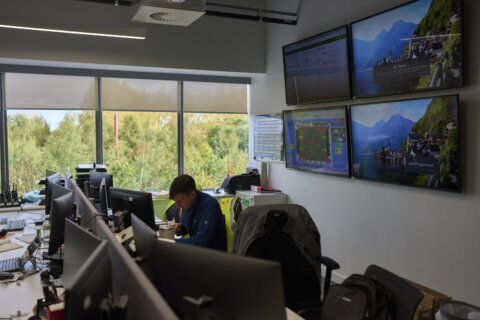Volunteer experience is an important element of the medical school application. In a field defined by service to others, it may be no surprise that many students continue giving back throughout the course of their medical studies.
Volunteering offers a range of personal and professional benefits, experts say. It can sharpen students’ skills, shape their career decisions and inform their perspective on the broader health care landscape. Volunteering can also help students balance an intense academic workload and avoid burnout.
Ultimately, volunteering helps students grow as people and future doctors, experts say.
Here are some ways to get involved while in medical school.
Volunteer at a Free Clinic
Many medical schools have student-run free clinics that connect underserved communities with health care they otherwise might be unable to access.
It’s a “choose-your-own-adventure” experience, says Caroline Madigan, a third-year student at Chicago Medical School at Rosalind Franklin University of Medicine and Science in Illinois. Some volunteers are involved with the day-to-day clinical work while others pursue roles in administration, ensuring that the clinic runs smoothly.
[How to Get Into Top Medical Schools]
Free clinics offer valuable opportunities for professional development. As president of her school’s free clinic, Madigan gained exposure to the administration side of medicine and developed an understanding of what it takes to effectively run and expand a clinic.
As volunteers, students can also enhance their communication skills and learn to work with a medical team.
“I was able to develop those skills well in my preclinical years through the free clinic, and then I’ve been able to refine them, as opposed to developing them, during my third year,” says Madigan, who is the national president of the Society of Student-Run Free Clinics. “That has definitely been a big bonus of spending some time with the free clinic.”
Volunteering also helps cultivate empathy, says Owen Lubinski, the society’s president-elect and a second-year student at George Washington School of Medicine and Health Sciences in Washington, D.C.
One study suggests that volunteering at free clinics can help students maintain their empathy during medical school. Non-volunteers, on the other hand, tend to experience a decline in empathy.
“It’s important to realize that the service that you’re doing, the good you’re giving, is also helping you be a better person,” says Lubinski, who is also co-executive director of the GW Healing Clinic.
Mentor Students
High school and premed mentorship are other volunteer opportunities available to med students, says Maame Amoako, a fourth-year student at Duke University School of Medicine in North Carolina and former co-president of Duke’s chapter of the Student National Medical Association.
Many programs offer mentorship to aspiring doctors. Duke SNMA’s Health Professions Recruitment and Exposure Program, for example, introduces high school students to careers in science, technology, engineering and mathematics (STEM) and medicine. Members organize events where students can work on resumes, practice interview skills and attend panels with medical professionals.
[Read: Why It’s Hard to Get Into Medical School Despite Doctor Shortages.]
Educate the Community
Medical students can also participate in community education initiatives.
Some medical schools, like the Warren Alpert Medical School at Brown University in Rhode Island, partner with local public school systems to provide student-run sex education programs.
Other programs provide education in a health care setting. The Teen and Tot program at Boston Medical Center in Massachusetts, for instance, provides a range of medical services to people under 23 who are parents or pregnant, and their children.
Education is an important component of this program, says Dr. Kristen Goodell, associate dean of admissions and assistant professor of family medicine at the Chobanian & Avedisian School of Medicine at Boston University in Massachusetts. During the medical group visit, volunteers address parenting questions like, “When should I start feeding my baby solids?” and “How do I get my baby to sleep?”
Participate in Community Support and Justice Programs
Community health, public health and medicine are intertwined, experts say.
“I think it’s almost impossible to do medicine without thinking about, ‘What are the things that determine somebody’s health and how do people end up in the hospital?'” Amoako says.
Programs that address these social determinants of health — like economic stability, education and health care access — might be attractive to med students.
For example, students can volunteer with organizations that combat food insecurity. At Root Causes, a student-run organization at Duke, volunteers distribute fresh produce to people in need.
Socioeconomic status is another factor that affects health outcomes. StreetCred, a Boston Medical Center program, embeds “assistance with economic resources into pediatric primary care” by offering free tax preparation and connecting eligible families with government programs, according to its website. Volunteers aim to improve the economic well-being and, by extension, the health of youth and their families.
When you’re in school, medicine can feel black and white, but patients’ lives are often complicated, Goodell says. Volunteering can expose future doctors to the complexities and nuances of medical practice.
“There are several organizations where medical students and undergraduates will partner with hospitals and clinics, and their job is to help identify resources that patients might need,” Goodell says.
At Socially Responsible Surgery, an organization committed to health equity, volunteers assess social determinants of health that may disrupt patients’ care. Volunteers identify and connect patients and families with needed resources.
[READ: Most Common Reasons Medical School Applicants Get Rejected]
Staying actively engaged is a good way to learn about the communities you will serve, experts say.
“A lot of the time, they’re the ones teaching us about what the needs are and what the barriers are to being healthy and getting good care, and that could impact how you decide to practice medicine,” Amoako says.
Try Unrelated Volunteer Work
Medical students might choose to do volunteer work that isn’t tied to medicine or health care. Some continue with service work they did previously, like with a church community, for example.
It’s important for med students to retain their essential identities. and sometimes volunteering can be a way to stay rooted, Goodell says.
When balancing medical school and volunteer work, experts say it’s important to find missions you’re passionate about. Volunteerism that is fulfilling can complement your medical education.
“It’s a great way to break up the monotony of going to lectures and studying, and a great way to fill my own bucket as a medical student and make sure that I’m still functioning and succeeding,” Lubinski says.
Searching for a medical school? Get our complete rankingsof Best Medical Schools.
More from U.S. News
6 Underserved Populations Premeds Can Work With
Ways Premed Students Can Work With People With Disabilities
Consider Size When Choosing a Medical School
How and Why You Should Volunteer While in Medical School originally appeared on usnews.com







